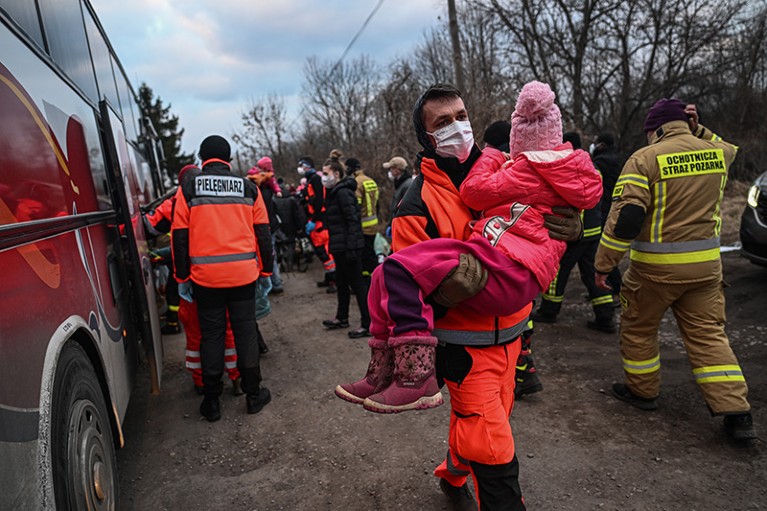
Paramedics take Ukrainian children with cancer to a Polish border town. Before the war, clinical trials were a route to advanced treatment.Credit: Omar Marques/Getty
After Russia invaded Ukraine on 24 February 2022, Mykola Zubaryev, a surgical oncologist, felt that he and his family would no longer be safe in Kyiv. “It was a dark time,” Zubaryev recalls.
Zubaryev left his job at the National Cancer Institute of Ukraine in Kyiv and moved his family to Lviv, the largest city in the country’s west. He accepted a position at the Multidisciplinary Clinical Hospital of Emergency and Intensive Care, where he was tasked with establishing and managing new oncology services. He was also involved in setting up the hospital’s Coordination Center of Clinical Trials, which oversees international randomized clinical trials.
Zubaryev’s vision for the centre was to host international trials for melanoma and breast, gastrointestinal and lung cancer treatments. Despite the war, he and his colleagues were able to appoint a chief, hire staff and complete construction, and by April 2023, the centre was ready to accept trial participants.
Since the conflict began, international pharmaceutical companies have not brought any new oncology trials to Ukraine, although most pre-existing cancer clinical trials with enrolled patients have continued to run. Now, doctors including Zubaryev think it’s time to consider launching new trials in places such as Lviv, which so far has been a relatively safe haven. “I am very keen to initiate international trials again in Ukraine,” Zubaryev says. “Our patients benefit from these trials a lot.”
Ninety per cent of clinical trials testing new cancer medicines are funded by pharmaceutical companies, says Christopher Booth, an oncologist at Queen’s University in Kingston, Ontario, Canada. “They determine trial design, who leads the trials and where they will be done,” says Booth.
Over the past decade, pharmaceutical firms based in high-income countries have increasingly moved their trial sites to lower middle-income and upper middle-income countries. A 2022 study published by Booth and his colleagues found that 29% of 636 oncology trials from 2014 to 2017 were held in such countries (F. Rubagumya et al. JAMA Netw. Open 5, e2227252; 2022).
Ukraine participated in 46% of the 89 oncology randomized clinical trials held in lower middle-income countries (LMICs) between 2014 and 2017, which places it second in the world among LMICs after India, a country with more than 30 times Ukraine’s population. Russia’s role in cancer clinical research is also significant. Of 181 trials in upper middle-income countries (UMICs) conducted from 2014 to 2017, Russia participated in 64%. This placed it top for UMICs, according to the study, followed by Brazil, with 52% participation.
A dark time
Several factors account for both Ukraine’s and Russia’s appeal as sites for cancer clinical trials. For starters, both countries offer substantial savings for sponsors, costing them up to 40% less compared with running the same trial in the United States or Western Europe, says Vlad Bogin, the founder and chief executive of Cromos Pharma, a Portland, Oregon-based company that runs clinical trials for small and medium-sized pharmaceutical companies. Before the war, Ukraine and Russia accounted for about 25% and 20%, respectively, of the total cancer clinical trials that Bogin and his colleagues oversaw.
Ukraine and Russia also both enjoy “established and technologically advanced health care, and they have highly trained clinicians and researchers”, says Timothy Clay, a medical oncologist at Edith Cowan University in Western Australia. “But they also have more modest means, and one way of allowing their citizens to access the most advanced therapies is to contribute to clinical trials.”
Health care is by law meant to be free in Ukraine, but in reality, citizens often end up paying for some or all of their care, including oncology treatments, Bogin says. Advanced therapies of the sort offered in clinical trials also tend to be hard to come by, making participation an easy decision for patients. Bogin’s Ukrainian trial sites typically enrolled participants three to seven times faster compared with higher-income countries.
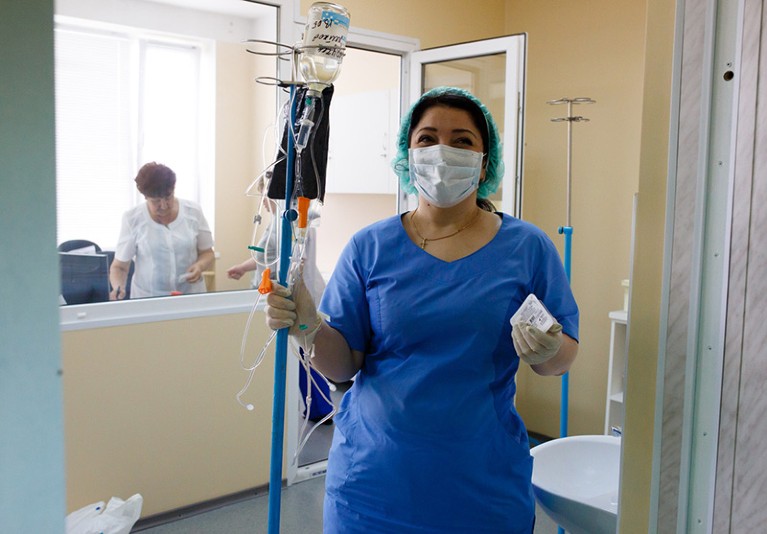
A nurse prepares an intravenous cancer medication at the clinical-trials centre in Dnipro.Credit: Igor Bondarenko
Clinical trials are also an attractive prospect for Ukrainian clinical researchers. They are well compensated for participating, says Tetyana Demidenko, co-owner and clinical operation director of CT Academia, a Kyiv-based contract research organization, which provides research services to larger pharmaceutical firms. Although, adds Demidenko, “they tell me that it’s not only about the money for them”. Some clinical investigators also benefit from access to novel therapeutics for their patients and a chance to collaborate with the international community.
In some ways, Booth says, the shift to conducting such work in lower-income settings is good news. “Trials are representing more diverse patient populations and providing treatments to patients who otherwise would not have access to them because of the cost.”
Yet the impacts of ‘research parachutism’ — in which affluent countries conduct projects in lower-income settings with limited or no participation of local researchers — can be significant, and don’t necessarily provide long-term health-care solutions for host countries. “Once a pharmaceutical company gets approval for a drug, the price is so astoundingly high that never in a million years will it be available in the country where the data is generated,” says Booth.
Not only can such a practice leave resource-poor places vulnerable to the changing whims of industry, but it also makes it difficult for researchers who conduct the trials on the ground to gain credit in the scientific literature. Ukrainian authors appear in just 2% of global cancer-research publications, according to the study by Booth and his colleagues.
Ivan Vyshnyvetskyy, head of the Ukrainian Association for Clinical Research in Kyiv, does not see this as a sign of “unfairness or mistreatment”, however, noting that “the majority of [clinical] investigators do not contribute enough to the scientific process” to warrant inclusion on publications. “Investigators are mostly engaged in enrolling patients and collecting data and are not invited to draft protocols or publications, so they are not mentioned as co-authors of publications,” he says.
For some host countries, clinical-trial participation remains an attractive arrangement, says Vyshnyvetskyy. “This is not a pleasant truth, but in countries with weak health-care systems, clinical trials are always flourishing.”
Trials are not only a lifeline for patients with cancer in Ukraine, but also support a burgeoning medical industry, including hundreds of research centres and dozens of contract research organizations. As active trials come to an end and jobs disappear because of the war, doctors and other research professionals might decide to move away, taking with them years of expertise and experience.
Clinical research in conflict
In February 2022, just before the Russian invasion, investigators in Ukraine were actively carrying out 584 clinical trials, 245 of which were for cancer. Of these, 127 were still in the process of recruiting. Russia, meanwhile, had 667 active cancer trials, 353 of which were recruiting. Most of these were multinational, commercially sponsored phase III trials. Three-quarters were testing treatments for advanced disease and one-quarter involved potential cures.
During the first days of the Russian invasion, the State Expert Center, which oversees clinical trial regulation for Ukraine’s Ministry of Health, began issuing guidelines on its website to help clinical-trial sponsors and investigators navigate the situation. The centre also organized online meetings and workshops with hundreds of investigators from within and outside Ukraine to discuss how best to support the country’s oncology patients and clinical trials against a backdrop of war.
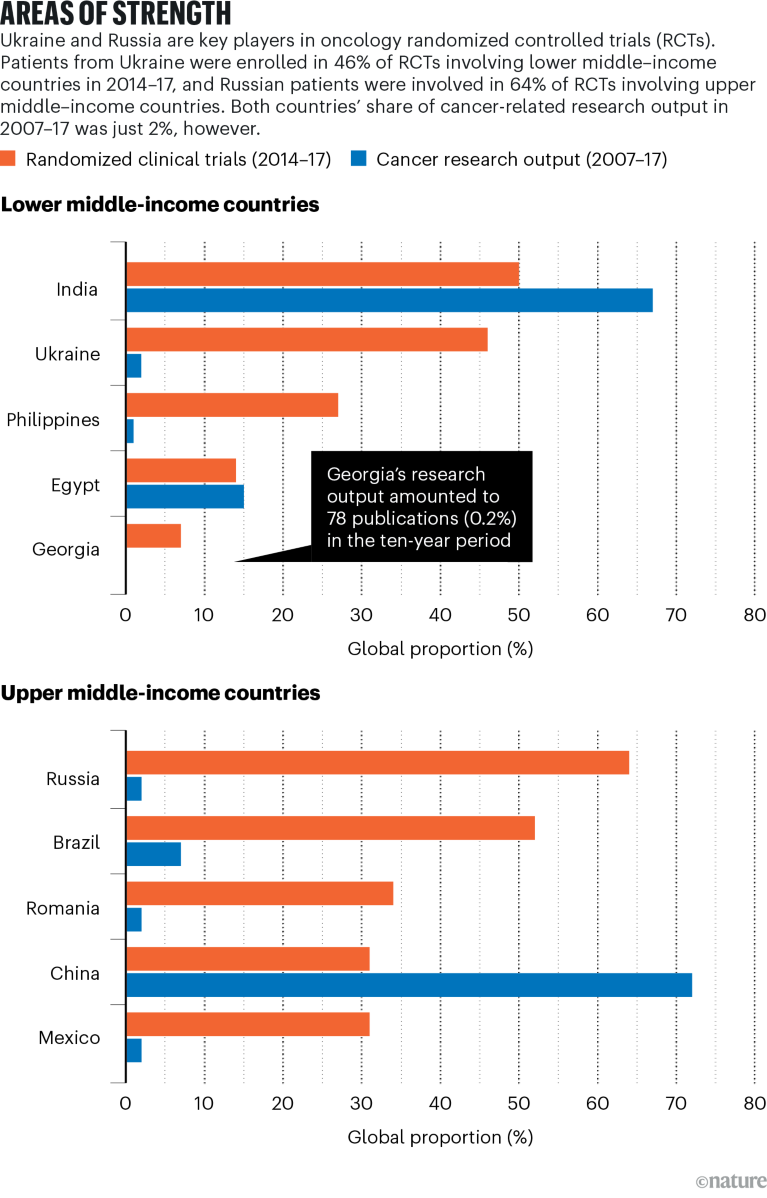
Source: F. Rubagumya et al.
“When the war started, the greatest challenge for us was how to manage all of these patients,” says Igor Bondarenko, head of the department of oncology and medical radiology at Dnipro State Medical University in Dnipro, Ukraine. The second concern, he says, was how to continue contributing to clinical trials. “We didn’t want to decrease the level of our reliability and quality of data.”
Across Ukraine, staff at clinical-trial sites began innovating. Some organized patient transport to hospitals, paid for by trial sponsors. Others arranged well-equipped bunkers for participants located near the front line. During electric outages, officials powered hospitals with generators to ensure that medications and biological samples were preserved. With all civil flights grounded, sponsors and trial staff also had to devise logistical solutions for transporting medications and samples by land. “International courier services were no longer available, so we prepared such logistics chains ourselves,” says Demidenko.
Strategies developed during the COVID-19 pandemic came in handy during the conflict, too. Telehealth capabilities were already in place, for example, allowing doctors to conduct consultations remotely. Bondarenko and his colleagues additionally benefited from an electronic database that they had built several years earlier for keeping track of patients. After the war broke out, they created a secure back-up system to store medical records and implemented a new translation function for 17 different languages, making it easier to share patient information among international trial sites. “This solution allowed us to manage clinical trial processes in a crisis situation,” Bondarenko says. “I think that it could be applied all over the world to help do clinical trials better.”
These and other efforts paid off. Despite being located just 130 kilometres from the front line, Bondarenko and his colleagues at Dnipro State Medical University have treated roughly 200 patients enrolled in 28 clinical trials since the start of the war, and provided sponsors with data for 3,000 visits. “Very often we heard air raids, and bombings and rockets,” Bondarenko says. “But we believed it’s necessary to continue to work.”
Some losses have been unavoidable. According to the State Expert Center, within the first 10 months of the war, 132 active clinical trials were ended prematurely. Around 1,100 Ukrainian medical facilities, primarily located in occupied territories, have been damaged or destroyed by the Russians, including an oncology hospital in Mykolaiv. At least 450 clinical-study subjects — around half of them oncology patients — were displaced within Ukraine or moved out of the country.
Medical staff were also unable to continue with studies. “Some doctors left our country due to safety reasons,” says Oleksandra Ponomarenko, a Kyiv-based project leader at KCR, a contract research organization headquartered in Boston, Massachusetts.
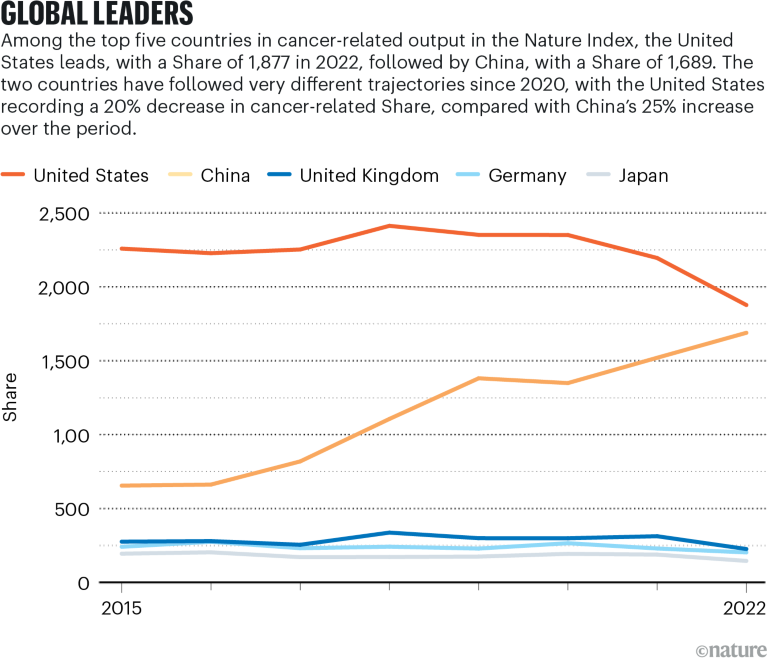
Source: Nature Index
Yet the quality of data produced by Ukrainian sites that have prevailed does not seem to have weakened. In 28 clinical-trial audits conducted throughout Ukraine in 2022, investigators found that all trials remained in compliance with international scientific and ethical standards. Other data gathered internally by certain sponsors indicate that Ukrainian investigators have actually increased their efficiency. “Before the war you could wait two or three weeks for data,” Demidenko says. “Now it’s a maximum of three days.”
Solutions pioneered by Ukrainians to provide such results could eventually be applied in settings around the world that have been impacted by conflict or other disasters. “We can learn from their experience around the logistics and ethics of how to conduct clinical-research activity in conflict,” says Mieke Van Hemelrijck, a cancer epidemiologist at King’s College London.
Work, not charity
Most of the early obstacles that investigators and their patients faced have now been solved, Vyshnyvetskyy says. Patients have mostly stopped moving within and out of the country, and most investigative teams in undamaged and unoccupied territories are working as usual. In Kyiv and western Ukraine, “locations are absolutely operationally ready to conduct clinical trials”, Vyshnyvetskyy says.
A few sponsors agree with his assessment. Sixteen small trials — including four being overseen by Demidenko and her colleagues — are actively recruiting patients in Ukraine (none focus on cancer, however). Although this is minuscule compared with before the war, “it’s a good sign that some sponsors believe the risks are justified”, Vyshnyvetskyy says.
Most sponsors, however, are still reluctant. The majority are finishing the trials they already had running in Ukraine and Russia before the war began and do not plan on starting new ones. The reasons differ between the two countries. “Russia has become a sort of non grata territory for any new research,” Bogin says. “There are a lot of good investigators there, and I feel really sorry for them, but at this point, the country has essentially cancelled itself out.”
For Ukraine, there’s a “fear of not being able to collect the data, of not being able to deliver the investigational product and of not being able to get the biological samples out in a timely fashion”, Bogin says. That said, his company has not left Ukraine and continues to support its staff there. “Unequivocally,” says Bogin, they will bring new trials to Ukraine when the war ends.
Calls for cross-border collaborations to resume highlight the importance of Ukraine’s contribution to the global cancer knowledge base. Andreas Charalambous, president of the European Cancer Organization, has urged the international community “to help rebuild the infrastructure to allow Ukraine to maintain its pivotal role”.
Vyshnyvetskyy and others in Ukraine hope that the international community’s commitment to restoring the country’s clinical-trial industry does not mean waiting until the war is officially over. “We do not ask for charity; we ask for work,” Vyshnyvetskyy says. “This would be the best support we could be given.”

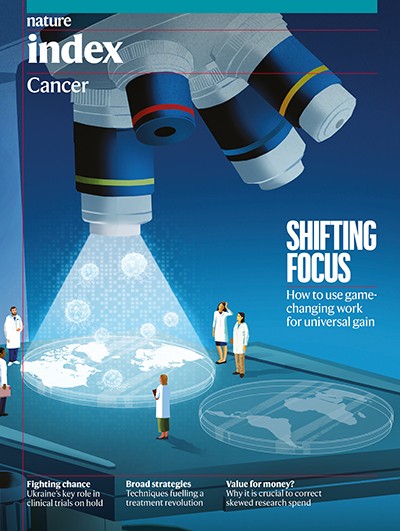
 Can cancer research shift its focus?
Can cancer research shift its focus?
 Four ways research aims to outwit cancer’s evasion tactics
Four ways research aims to outwit cancer’s evasion tactics
 Global leaders in science’s battle against cancer
Global leaders in science’s battle against cancer
 The gross imbalances of cancer research must be addressed
The gross imbalances of cancer research must be addressed
 African scientists call for research equity as a cancer crisis looms
African scientists call for research equity as a cancer crisis looms







